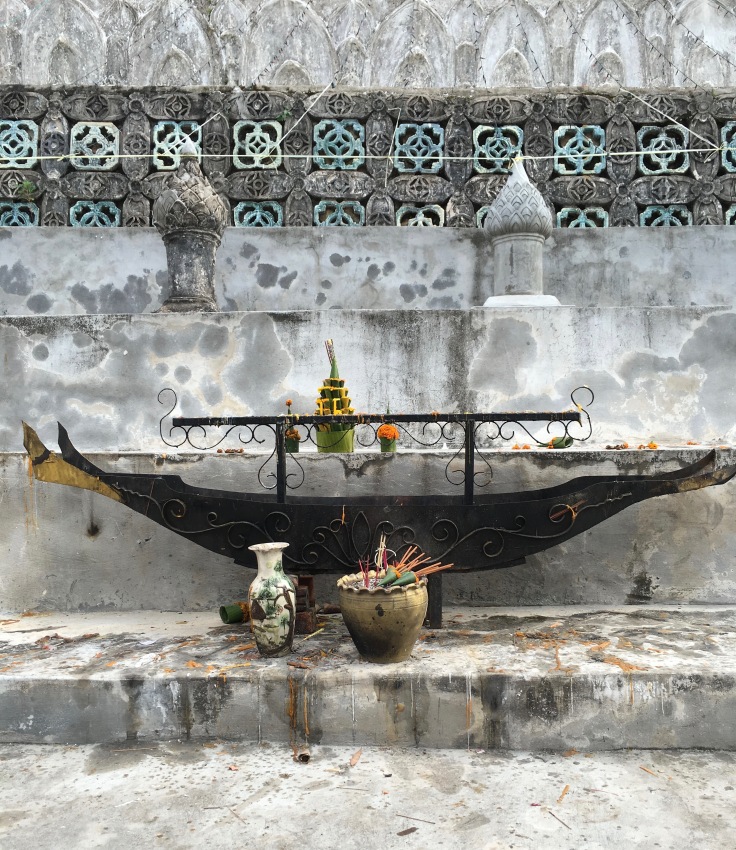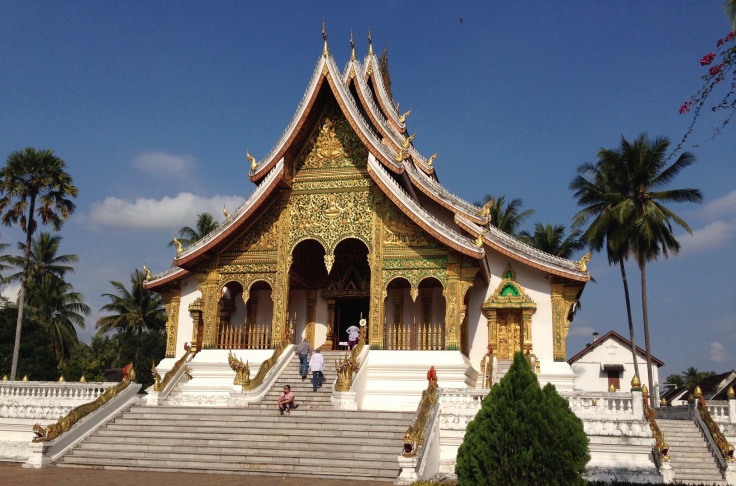
The Glory of Luang Prabang — An interview
Tell me about the town
People tend to stop briefly in Luang Prabang. They should stay longer. The town has distinctive French colonial architecture, two story buildings with tile roofs and prominent shutters, painted in soft colors, like ochre and off-white. It’s a peninsula, sitting between two rivers—the Mekong and Nam Khan—narrowing it to about four blocks wide. So, it’s easy to navigate, and walking around, it feels like you’re often on one of these pretty rivers. (More below this picture)
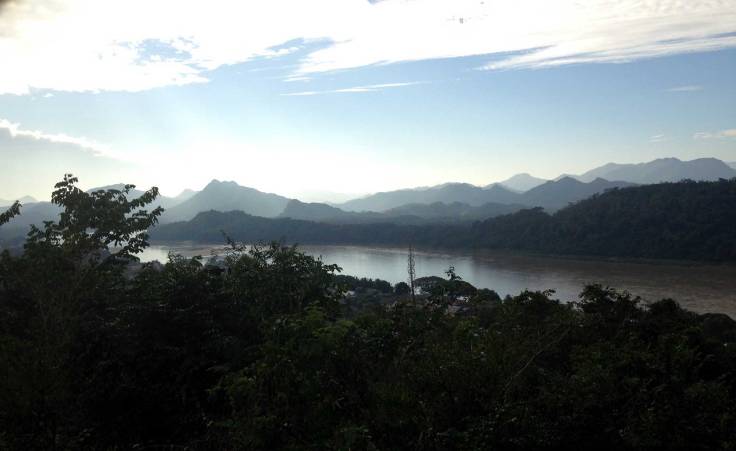
What did you do?
We’d been traveling a long time by then, so I didn’t reach for sites, really. Rather, I walked around the same streets in the town’s center, with sweet alleys running between them. Every time I turned a corner there was a breathtaking view: seeing the river between two buildings, framed with trees, a slightly irregular building shape with an ancient temple peaking through. And unlike so many places in Asia, there were actually sidewalks. So I could walk and bike around quite easily… And bread, thanks to the French. After being in Asia so long, croissants were a miracle. And crisp baguette sandwiches with chicken and mushrooms.
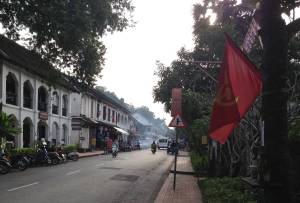
Wat’s the story?
Luang Prabang is a holy city filled with temples, chanting in the air. Good vibrations would sound like a hippie cliché if the phrase didn’t really apply.
You can’t go more than a few blocks without hitting a temple. They’re working temples, constantly maintained by novice monks in saffron robes. The drumming call to prayer is the audio landscape of Luang Prabang, echoing from temple to temple. 
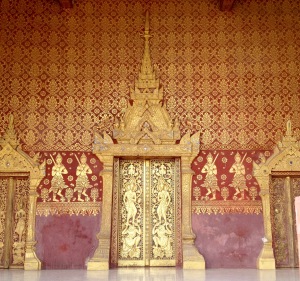
Often there was more than one structure on the grounds —one housing monks, another with a hanging drum underneath a small roof, the temple itself. Also, clotheslines with saffron robes drying. Always monk’s dogs wandering the grounds among building and restoration projects, while young novices fix walkways and walls, or a worker creates a elaborate cement bas relief over the entrance to the wat.
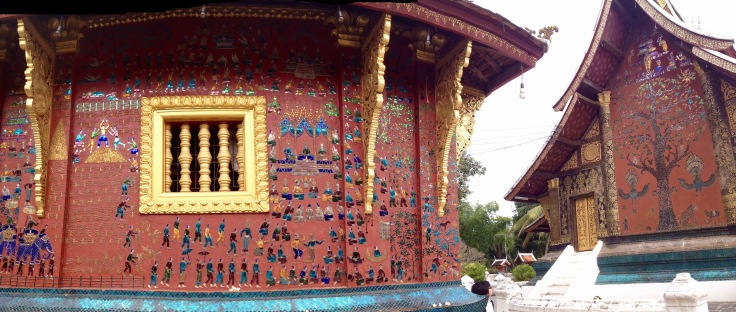
The Monks
Maybe there’s a better way to do this, but you can’t help but wonder if it’s respectful to go see the monks on their iconic barefoot walk at dawn to collect alms (food) for the day. Food is supposed to be cooked and offered up by followers. But what we witnessed was a zoo of gawking camera-hungry tourists. One handed a monk food he’d brought in, while his friends gathered round aggressively for a photo op. Apparently the monks have asked to stop their procession, but the government insisted they continue, as it brings in so many tourists.
Why not wander old town? You’ll pass young monks doing their homework, temple mosaics sparkling in the mid-day sun….

The Market
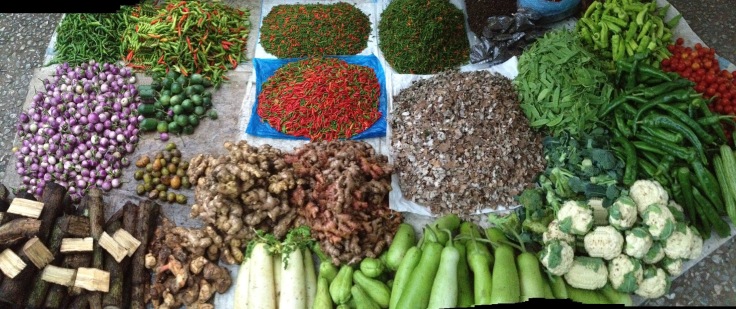
A manageable size, reasonably clean, this market’s food is a gawkers dream, with goodies varying wildly from fresh bat meat to multi-colored pastel mushrooms. Sure, for an early supper, popular buffets with some choice picks are set up there. But I’m not thrilled about food that’s been sitting. Rather, I like to stick with market ladies that make one thing, and well. Just walk slowly and look. Then go back and look again….
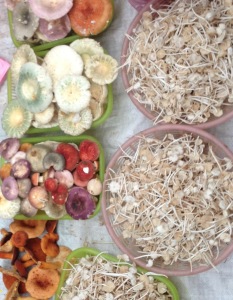
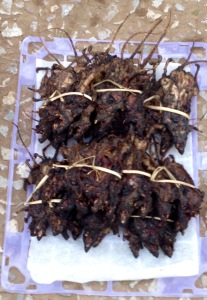
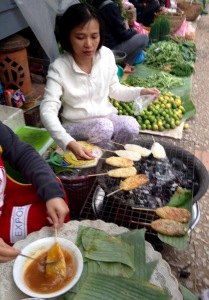
Our first early market breakfast?
Smokey Red Rice with Coconut Shavings in a Banana Leaf
Fried and Sweet and Hot Corn Cakes
Grilled Sticky Rice and Fish Ovals on a Stick with Chili Sauce
Lao Turnovers with Cabbage
Crispy Fish Fritters with Sautéed Greens
Glutinous Rice with Pork, Banana and Coconut
And that’s before we tackled the soups!
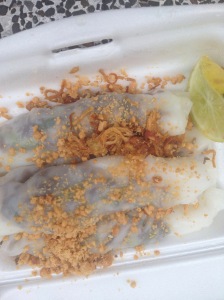
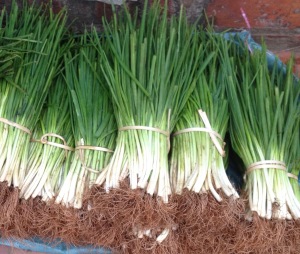
Good Eats
We particularly enjoyed The Tamarind for its upscale but unfussy, scrumptious Lao food, relaxed and informative English speaking service, and a cooking school so popular it was booked 3 months ahead. (Dinner? First time it was $7.50 each, the next, a food orgy was $10 each. That’s high when compared with our local food, but what a deal!)
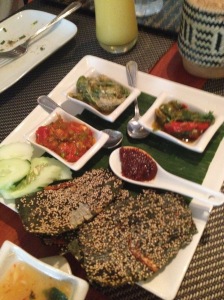
Tommy loved the “good soup served by nice people” at a tiny joint that boasted three types of soup with pictures of each out front. He forgets their name, but no doubt there are more of these kinds of places — tiny, clean, personal — that sustained us during our travels. And if you’re a regular at any of these, you get talking, as best you can. After awhile, as soon as you sit down, they give you what you like best, sometimes with a new side they know you’ll enjoy. One day we introduced ourselves to the 3-year old son of Tommy’s soup lady, pointing to ourselves, Amy, Tom. Then he pointed at us, naming us too — Farang, meaning foreigner, he,pointed to me, Farang pointed to Tommy. (For other food talk under, including about Laap, the national dish of Laos, see below under What to Eat in Traveler’s Tips)
Hmong New Year’s Celebration
We just happened to be in Luang Prabang during the weekend of Humong New Years, which was not a tourist event. The celebration the lasts 10 days, and is a time to honor ancestors spirits through offerings and rituals, games and courtship. It gives couples a change to meet, as they can’t marry within their clan.
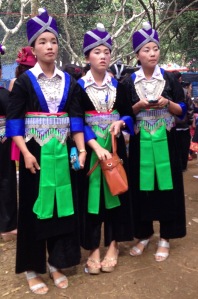
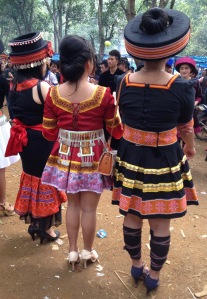
It was a crowded event, with stands for photo ops in costumes, food stands, and lots of garbage everywhere. We listened to a mournful solo singer, who riveted the crowds. And we watched Pov Pob, a courting game where two lines of eligible Hmong throw balls to each other in order to evaluate their actions and judgement. Different.
Today about 300,000 Hmong, who sided with the CIA during the war, live in the US. For a glimpse into the clash of cultures, read the fabulous The Spirit Catches You and You Fall Down by Ann Fediman.
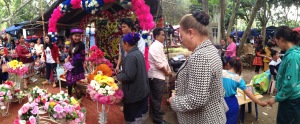
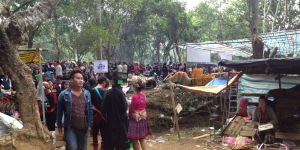
[wpvideo ODheuXmp]
Above: The nightclub Ticky took us to was empty when we arrived, just a lone singer and few musicians, all under colored lights. But, sick or not, I dragged myself up to dance with my pal Judy. Soon after, the place was shaking with Lao. (Not a foreigner in sight.) Tom loved the line dancing, especially the three hired dancers in their pink mini-skirts. And I dug the lovely Siamese-style hand movements that replaced Western pelvic swiveling. There was a poignant moment when travel-mate Shirley circled close with three Lao woman, all of them laughing together. (The English you hear at the end of the video, if you last that long, is Ticky’s, ever enthusiastic.)
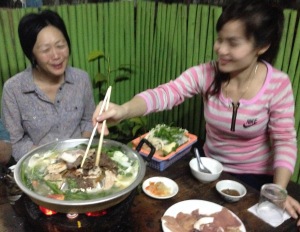
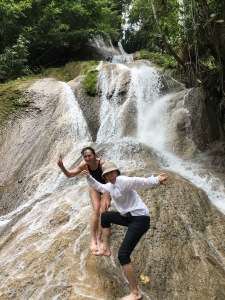
Traveler’s Tips
Getting There
Mae Salong to our boat to Laos
We took an easy hour bus ride from Mae Salong to the city of Chiang Rai, both in Northern Thailand. We hung out there for several days, more than we needed, eating hot pot at the night market and seeing the White Temple and Black house. Then we took yet another bus, for just under 2 hours, right from the station to Chiang Khong. Both buses cost next to nothing.
There, we stayed at a simple, but spotless room overlooking mighty Mekong and typical rock hard bed. Day Waterfront Hotel’s gracious, talkative Chinese-Thai owner speaks fabulous English, and likes to guess people’s origins. He’s often correct. Pointing across the river from to Laos, he signed about the low key Lao. Not go-getters, he told us, unlike the Vietnamese, who do very well in business there. We woke to loudspeaker announcements across the river in Laos, a fluttering red flag, and a single Lao biking by.
Chiang Khong was short-changed a few years ago when the Thai-Laos Friendship Bridge was installed. Now, tourists generally zoom across, no longer using it as an overnight stop.
In the evening we biked along the short waterfront stretch and strolled the near empty streets, chatting with a vegetarian restaurant owner, who baked whole wheat bread and cooked Mexican food, both rarities.
Two day boat ride to Laos
Next leg? Chiang Khong, Thailand to Luang Prabang, Laos.
After reading ghastly reviews about the overcrowded public boats and dangerous speedboats that run from Thailand to Laos, we splurged on Nagi of Mekong, one of the better boat lines, a whopping $130 each for two days. This included pick up at the hotel, a comfy 2-day boat ride, 2 nice lunches on the boat, an overnight stay at the basic, but quite lovely Mekong River Lodge in Pakbeng, a small town overlooking the Mekong. I only wish that the guide had given us the right directions to the early morning market the next day, or we might have seen it. (So you know, go down the main street away from the dock and turn left. Don’t go straight as we did.)
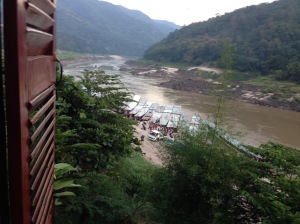
Also included were two sad, awkward and intrusive Lao village visits. Truth be told, most folks felt these excursions were somewhat interesting, and some of the women sold lovely scarves. We also stopped off at the cool Pak Ou cave, right on the Mekong, which was filled with Buddhas.
The first day’s ride was both pretty and comfy, even in the dry season, with small gardens along the river’s edge and occasional water buffalo. Trouble in paradise on the second day’s ride came in the form of a rainstorm that chilled everyone, about 20 of us, in this long open boat, the wind blowing, plastic sides being pulled down, blankets distributed. We were chilled to the bone.
Arrival
After a two day boat trip from Thailand, which I describe in the Traveler’s Tips below, we were dumped at a dock at the base of steep concrete stairs.
We were met with screaming. A gaggle of guys were dragging a man out of the river, where he’d flung himself between the dock and the boat, just as we were pulling in. Accident or suicide? A woman stood haranguing him, while his pals tried to hold him back from doing it again.
After dragging our luggage up, step by step, we arrived to shrieking from one of our travel mates, a teenage girl from Australia. She’d just witnessed a barking puppy, silenced by a man slitting his throat.
We were shaken, but our arrival was the direct opposite of our stay in this mellow town. And contrary to the kind, often shy Lao we met on our travels there.
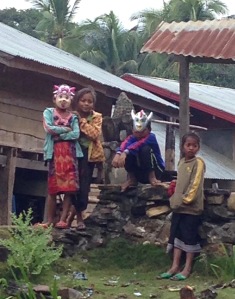
Where to stay
We stayed at a modest place for an excellent price right along the river, Khemkhong Guesthouse on Mekong River Road for $25 a night and very clean. It had no view, but a relaxed expat proprietor, Eric, who was fun to chat with. If you have the dough, scale up to a room with a view of a river or wat. It seems silly to stay out of town, as may tourists do, where you have to depend on a shuttle or cab. Town is what it’s all about.
What to Eat
Laap — also called larp —is considered the national dish of Laos, although it’s hugely popular in its own incarnation in Thailand, where it arrived via Isan, the Northeastern region that borders Laos. Generally, it’s a minced meat-based salad, but we also had it with added mushrooms and with fish, instead of meat. It’s seasoned in a variety of ways, usually with refreshing use lime juice, fish sauce, garlic, herbs, scallions or shallots, chilies and roasted rice powder, called padeak. We had it four or five times, but never hit a great version. But with those ingredients, the potential is there. Let me know if you find a wonderful version.
There plenty of restaurants in town offering both Asian and Western foods. We didn’t try them, as I’m always suspicious of a place that has too many choices. You can’t please everyone.
French restaurants abound, including the well-respected L’Elephant, recommended by the NY Times, but generally I don’t reach for French. Banneton Bakery has superb croissants and baguettes, though I would skip their entrees.
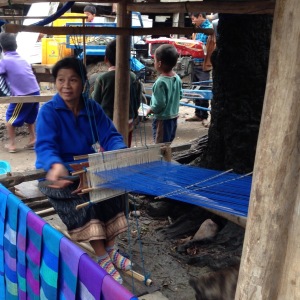
Other things to do in Luang Prabang
There is more. Judy and I enjoyed the small Traditional Arts and Ethnology Centre, which introduced us to the diverse tribes of Laos. We met a staff member who had just returned from NYC’s Metropolitan Museum of Art, where he was identifying hundreds of Lao objects.
I hear the Kuang Si waterfall is lovely, so visit! (It was too cold for us.) Or teach English at the Big Brother School in the morning or evening. You can just drop in around 9 am or 5-7 pm and engage in a conversation. It’s a great way to give a little something and meet a local, too. Hire a guide and go north. Check out the posters around town. Tom spotted a view at a hotel of the old silent film Chang, shot by the director in Laos by the director of King Kong. Terrific!
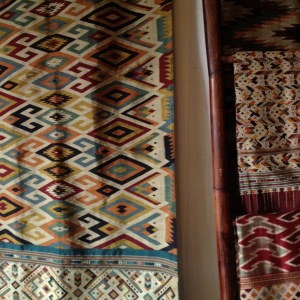
Shopping
The ground floors of most of the buildings are filled with restaurants or shops, but the pace is leisurely and no one hassles you. If you’re a shopper, there are fabulous textiles. (We’re not shoppers by nature, and we’re also on the road for 7 months with small suitcases.) My ever-generous pal, Judy, bought almost 30 scarves for family and friends, all quite pretty and reasonably priced. (If you want to splurge, there are also textiles of stunning quality.) We aren’t big on the night markets, as they are generally jammed with junk and tourists. Besides, you have to be a good shopper to separate the crap from the quality stuff. Everywhere we went we joked about a central factory in China that shipped everything around the continent, all with different labels. This said, there are good things to buy in some of the shops.
Laundry
We had our laundry done cheaply at one of the numerous places you pass while walking around town. Sure, it was a tad odd passing our underwear drying on the line in the street, but we weren’t in Kansas anymore. We also wondered how the laundress was able to tell which clothes were ours, as they were jumbled on the line. But Judy arrived early to pick hers up, and spotted her folding them, taking out a small colored stitch in each piece of clothing to distinguish them.
